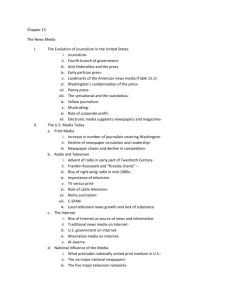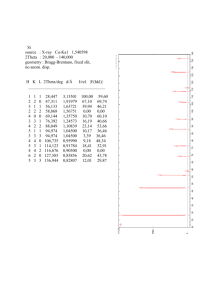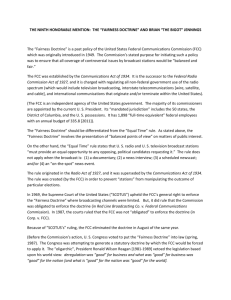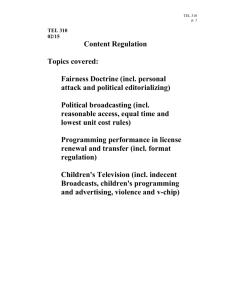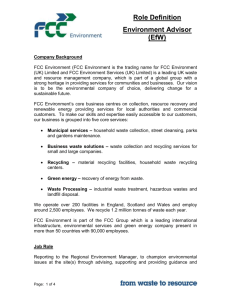Is the Fairness Doctrine a Hot Potato for the FCC?
advertisement
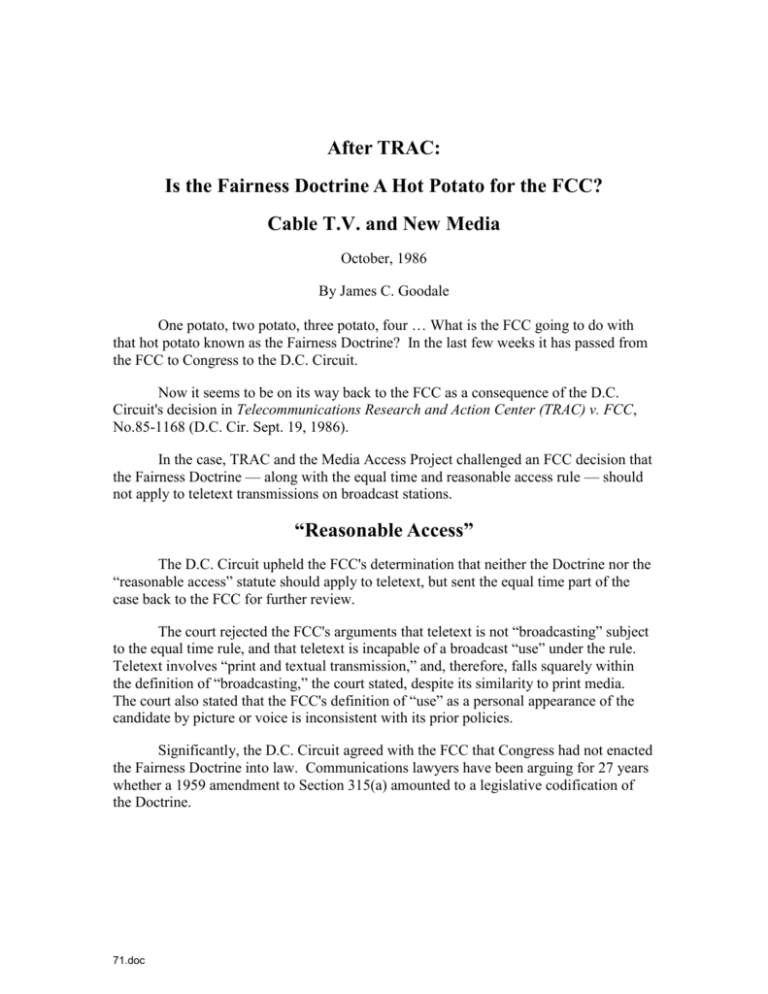
After TRAC: Is the Fairness Doctrine A Hot Potato for the FCC? Cable T.V. and New Media October, 1986 By James C. Goodale One potato, two potato, three potato, four … What is the FCC going to do with that hot potato known as the Fairness Doctrine? In the last few weeks it has passed from the FCC to Congress to the D.C. Circuit. Now it seems to be on its way back to the FCC as a consequence of the D.C. Circuit's decision in Telecommunications Research and Action Center (TRAC) v. FCC, No.85-1168 (D.C. Cir. Sept. 19, 1986). In the case, TRAC and the Media Access Project challenged an FCC decision that the Fairness Doctrine — along with the equal time and reasonable access rule — should not apply to teletext transmissions on broadcast stations. “Reasonable Access” The D.C. Circuit upheld the FCC's determination that neither the Doctrine nor the “reasonable access” statute should apply to teletext, but sent the equal time part of the case back to the FCC for further review. The court rejected the FCC's arguments that teletext is not “broadcasting” subject to the equal time rule, and that teletext is incapable of a broadcast “use” under the rule. Teletext involves “print and textual transmission,” and, therefore, falls squarely within the definition of “broadcasting,” the court stated, despite its similarity to print media. The court also stated that the FCC's definition of “use” as a personal appearance of the candidate by picture or voice is inconsistent with its prior policies. Significantly, the D.C. Circuit agreed with the FCC that Congress had not enacted the Fairness Doctrine into law. Communications lawyers have been arguing for 27 years whether a 1959 amendment to Section 315(a) amounted to a legislative codification of the Doctrine. 71.doc Public Interest Should Prevail In TRAC, the D.C. Circuit held that Congress intended the amendment to ratify “the Commission's long-standing position that the public interest standard authorizes the fairness doctrine.” Unless Congress made the Doctrine a statutory requirement, the FCC was free — constitutional considerations aside — to adopt or reject the Fairness Doctrine, the Court said, depending on its view of the “public interest” standard set forth in the 1934 Act. As to the FCC's teletext rule, the D.C. Circuit agreed with the FCC that the public interest did not require the application of the Fairness Doctrine to teletext, because it would impede the development of new technologies. Bombshell Ruling of Sorts The D.C. Circuit's decision was a bombshell to the extent that no court had ever actually held that Congress had not codified the Fairness Doctrine when it amended Section 315 in 1959. At least the D.C. Circuit has held that Congress never legislated the Fairness Doctrine and the FCC is free to consider whether the public interest requires the Fairness Doctrine for any medium, including cable and broadcasting. Indeed, a few days later, the D.C. Circuit heard arguments in two Fairness Doctrine cases, Meredith Corp. and Radio-Television News Directors. Meredith Corp. v. FCC, No. 85-1723 (D.C. Cir. filed Oct. 31, 1985); RTNDA v. FCC, No. 85-1691 (D.C. Cir. 1985). The D.C. Circuit badgered FCC General Counsel Jack Smith as to why the FCC enforces the Doctrine at all if the FCC believes, as stated in last year's Fairness Report, that the constitutionality of the Doctrine is “suspect.” In the report, the Commission concluded that the Fairness Doctrine may not justify content regulation in view of many new technologies. It nonetheless concluded not to eliminate the Doctrine because of “intense congressional interest in the fairness doctrine,” even though it “no longer serves the public interest.” Smith's answer to the D.C. Circuit's question was: “We're between the rock and the hard place.” Why a rock and a hard place? To put it nicely, the FCC is finely tuned to the political realities of administrative rule-making in Washington. To put it another way, from time to time the Congress understandably acts like a member of Frank Perdue's flock. If the FCC abandons the Fairness Doctrine, as the D.C. Circuit's questions seem to suggest it should, then Congress will turn up the temperature at the FCC to make life at the agency uncomfortable. 2 71.doc A Look Ahead Congress presently is sitting on a rider to the appropriations bill which would require the FCC to reconsider — and presumably to modify — last year's Fairness Report, e.g., to find that the Doctrine is constitutional and in the public interest. If Congress passes the rider and the D.C. Circuit sends the Meredith and RTNDA cases back to the Commission, e.g., to find enforcement of the Doctrine not in the public interest, the FCC will be faced with two conflicting instructions. The FCC naturally wishes to please Congress, particularly when that body has not acted on the FCC Chairman's nomination for a second term. But no one can serve two masters. The way out of this dilemma may be for the FCC to follow the law. And right now, unless reversed by a full panel of the D.C. Circuit, if any, the law under TRAC is that the FCC can, and perhaps should, rid itself of the Fairness Doctrine. 3 71.doc
